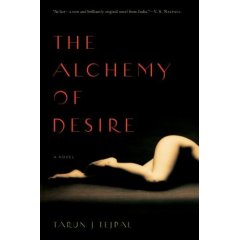
The Alchemy of Desire
By Tarun Tejpal
The book grabs you immediately with a dramatic opening line: “ Love is not the greatest glue between 2 people. Sex is.” The narrator (nameless throughout) you soon discover, is a young man in a marriage that is coming unglued slowly but surely. Desire, which has been a constant presence in their relationship, summoned up at will, any time anywhere, has suddenly and quite mysteriously disappeared. The narrator finds himself no longer desiring his wife Fizz (Fiza), a beautiful almost impossibly perfect woman. The novel takes us along their story at a brisk pace. A young couple, hopelessly in love, gets married, sets up house and with the husband’s ambitions of becoming a writer, struggle with holding down day jobs while allowing him to write at night. For this, they move from cozy Chandigarh to a harsher Delhi. With some money coming to them from his dead grandmother ( her story is one of my favourite parts of the book), they buy an old house in the Himachali hills. For a while, they enthusiastically do up the house, coming there every weekend from Delhi. While the husband struggles with writer’s block, their dream house is getting completed, a new roof is laid, bathrooms built and trees planted. That is when the buried diaries are discovered and their lives are irrevocably changed. The diaries detail out a parallel story, that of an American woman, Catherine, the original inhabitant of the house.
Catherine’s story is set in the late 19th century and veers from her American upbringing, her dad’s ‘exotic’ Indian store in New York, her flight to London and Paris to escape a marriage and her hedonistic life in Paris. It is in Paris that she meets an Indian prince who marries her and brings her to India. The Nawabi life, the strange relationship she shares with her homosexual husband and the palace intrigues that drive them into the hills to the house that Fizz and her husband buys in another century form her story. Catherine’s sexual appetite, her love affair with her husband’s lover and the strange turns this affair takes are detailed by her in her diaries. The diaries and her husband’s obsession with Catherine drive Fizz away. And the narrator is left to himself to play detective and uncover the mysteries that Catherine’s story contains. His discovery of the underlying truths unblocks his writer’s block and the end of the book sees him seeking Fiza out again and starting a book with the line, “Sex is not the greatest glue between 2 people. Love…”
Tejpal’s writing is bold and striking and he has an unabashed way of using drama in his words and phrases. The sex is prolific and after the initial excitement, it begins to pall. Catherine’s story especially has some pretty graphic descriptions of all kinds of couplings. Soon you begin to skip the sex parts and you realize that it is a lot of skipping. You then have to force yourself back into the story.
Overall, the book is interesting, purely because it tackles a refreshingly unusual theme – exploring the substance of desire. It goes just that bit over the top though – in language, in the depiction of an exotic 19th century India, in the sex. A bit more restraint might have made this a better book. But then again, it might have taken away some of its originality as well. My recommendation? Read it. There are worse books out there.


2 comments:
Interesting, very much so, my list is getting longer.
restraint's for ninnies..give me no-holds-barred anyday....btw, wd you mind not laying out the whole plot..some of us might want to read the book, you know?
Post a Comment